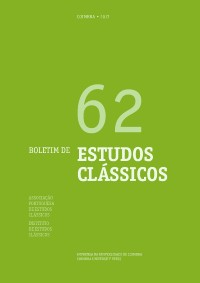Please use this identifier to cite or link to this item:
https://hdl.handle.net/10316.2/91049| DC Field | Value | Language |
|---|---|---|
| dc.contributor.author | Ferreira, Fátima | - |
| dc.date.accessioned | 2017-12-26T16:43:21Z | |
| dc.date.accessioned | 2020-09-21T05:31:03Z | - |
| dc.date.available | 2017-12-26T16:43:21Z | |
| dc.date.available | 2020-09-21T05:31:03Z | - |
| dc.date.issued | 2017 | - |
| dc.identifier.issn | 2183-7260 (PDF) | - |
| dc.identifier.issn | 0872-2110 | - |
| dc.identifier.uri | https://hdl.handle.net/10316.2/43374 | - |
| dc.description.abstract | A aposta crescente a que se tem vindo a assistir recentemente na área das Línguas Clássicas, no Ensino Básico e Secundário em Portugal, requer uma revisão dos conceitos da sua didática específica, que traduza uma síntese entre as práticas do passado e as novas tendências dos métodos pedagógicos. A escola do século XXI necessita de entender o Latim como uma disciplina dinâmica, cuja metodologia de ensino se aproxime da metodologia ativa das línguas modernas, valorizando a oralidade, a compreensão textual, a aquisição de vocabulário e, sobretudo, a consciencialização de que esta disciplina representa um pilar imprescindível para muitas áreas de estudo, contribuindo para a formação integral e integradora dos alunos. A importância que o Latim assume nas Humanidades requer que se atualizem os métodos, nomeadamente a abordagem da gramática e a integração da cultura. Desta forma, o presente artigo pretende constituir uma reflexão acerca das perspetivas atuais do ensino das Línguas Clássicas, analisando, em retrospetiva, algumas opiniões de especialistas e acrescentando algumas sugestões metodológicas. | por |
| dc.description.abstract | The growing emphasis on classical languages requires a review of the concepts of their specific Didactics, which should consist of a synthesis of past practices and new trends in teaching methods. The 21st century school needs to perceive Latin as a living subject, whose teaching methodology approaches the active methodology of modern languages, valuing oral skills, textual comprehension, vocabulary acquisition and, above all, the awareness that this subject represents an essential pillar for many of the study areas, contributing to the integral and integrative education of students. The importance of Latin in the Humanities requires up-to-date methods, namely the approach to grammar and the integration of culture. In this mode, the present article intends to constitute a reflection on the current perspectives of the teaching of the Classical Languages, analyzing, in retrospect, some expert opinions and adding some methodological suggestions. | eng |
| dc.language.iso | por | - |
| dc.publisher | Imprensa da Universidade de Coimbra | - |
| dc.rights | open access | - |
| dc.subject | Didactics | eng |
| dc.subject | Latin | eng |
| dc.subject | Teaching methodologies | eng |
| dc.subject | Didática do Latim | por |
| dc.subject | Latim | por |
| dc.subject | Metodologias de ensino | por |
| dc.title | Ensinar e aprender latim no séc. XXI | por |
| dc.title.alternative | Teaching and learning Latin in the 21st century | por |
| dc.type | article | - |
| uc.publication.collection | Boletim de Estudos Clássicos vol. 62 | - |
| uc.publication.firstPage | 125 | - |
| uc.publication.lastPage | 137 | - |
| uc.publication.location | Coimbra | - |
| uc.publication.journalTitle | Boletim de Estudos Clássicos | - |
| uc.publication.volume | 62 | por |
| dc.identifier.doi | 10.14195/2183-7260_62_8 | - |
| uc.publication.section | Didática | - |
| uc.publication.orderno | 9 | - |
| uc.publication.area | Artes e Humanidades | - |
| uc.publication.manifest | https://dl.uc.pt/json/iiif/10316.2/91049/229337/manifest?manifest=/json/iiif/10316.2/91049/229337/manifest | - |
| uc.publication.thumbnail | https://dl.uc.pt/retrieve/11440820 | - |
| item.grantfulltext | open | - |
| item.fulltext | With Fulltext | - |
| Appears in Collections: | Boletim de Estudos Clássicos | |
Files in This Item:
| File | Description | Size | Format | |
|---|---|---|---|---|
| ensinar_e_aprender_latim_no_sec._xxi.pdf | 265.71 kB | Adobe PDF |  |
Items in DSpace are protected by copyright, with all rights reserved, unless otherwise indicated.
